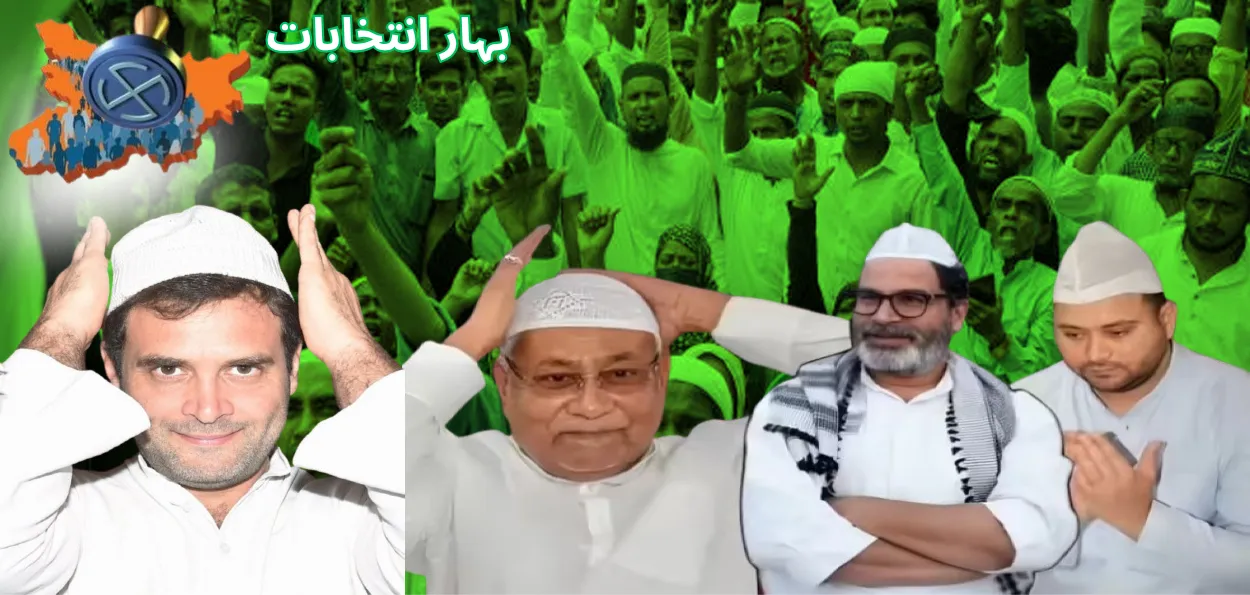
New Delhi
Bihar, where Muslims constitute about 18 per cent of the population, and the community's voters play a decisive role in the outcome of Assembly elections in at least 87 legislative assembly constituencies, the parties have not picked proportionate number of Muslim candidates to contest the forthcoming polls.
Their presence in the 2025 Bihar assembly elections is tokenistic. After the final lists of candidates were released by major political parties, Muslims were disappointed to see a big discrepancy between the population of Muslims and their political representation, especially in the ruling National Democratic Alliance (NDA).
According to a report by Clarion India, out of the 243 assembly seats, the NDA has fielded only five Muslim candidates. The BJP, which is contesting on 101 seats, has again not given tickets to Muslims. Its ally Janata Dal (United) or JD(U), led by Chief Minister Nitish Kumar, has fielded only four Muslims, Saba Zafar (Amour), Manzar Alam (Joki Hat), Shagufta Azim (Araria) and Mohammad Zaman Khan (Chinapur). The fifth candidate is Mohammad Kaleemuddin Bahadurganj on an LJP (Ram Vilas) ticket.
Four of the five candidates are contesting from the Muslim-majority districts of Seemanchal viz: Jokihat, Araria, Amor and Bahadurganj. In these constituencies Muslim population is between 40 and 70 percent. Only Zaman Khan, a former BSP MLA and the Minister for Minority welfare, is contesting from the non-Muslim-majority district of Kaimur. This geographical demarcation seems to be an attempt to avoid polarisation of the Hindu vote, but at the same time limits Muslim representation to a certain extent.
This is a clear decline from 2020, when JD(U) fielded 11 Muslim candidates, though none won. Political parties often say that the candidates are selected for their winnability value and hence selecting Muslims if they cannot win is not done.
According to analyst Mahmood Alam, “This is not representation but imprisonment. Muslims have been confined to specific areas so that even their victory does not affect the balance of power.”
The influence of caste is clearly visible in the NDA's ticket distribution. Upper castes have received 85 out of 243 tickets, even though they constitute only 10.5 percent of the population.
The scenario in the opposition India Bloc is not much different. The RJD has not yet released its full list, but has so far announced only three Muslim candidates. The Congress, which is contesting on 48 seats, has given tickets to four Muslim candidates. Senior party leader Tariq Anwar himself has expressed displeasure over the ticket distribution, saying that the party is not serious about representing minorities.
On the other hand, Asaduddin Owaisi's AIMIM, which is contesting under the Grand Democratic Alliance , has fielded seven Muslim candidates and plans to contest a total of 32 seats, but its influence is largely limited to Seemanchal.
In contrast, Prashant Kishor 's Jan Swaraj party has promised genuine inclusion. So far, it has fielded 20 Muslim candidates, and according to Kishor, the number could reach 40, making it the only party that is trying to provide relatively proportional representation.
In 2015, the alliance of RJD, JD(U) and Congress had sent 24 Muslim MLAs to the assembly, about 10 per cent of the total seats. Many of them won from mixed constituencies, supported by Muslim-Yadu alliances. In 1985, 34 Muslim MLAs were elected during the Congress rule, a record that still stands. Four decades later, the situation is completely reversed. Muslim representation has dwindled to an alarming extent.
This distrust has been compounded by Nitish Kumar’s recent behaviour, such as not wearing a cap at religious functions, supporting the controversial Waqf Amendment Bill, and JD(U) leader Devesh Thakur’s statement that “I will not help Muslims and Yadavs because they did not vote for me,” he said though it was later retracted.
Shamwaz Badar Qasmi, a social activist from Sitamarhi, told Clarion India, "We are 18 percent of Bihar's population, but our representation in the ticket lists is just 2 percent. This is enough to tell the whole story."
ALSO READ: Did Malayalam movie Aadujeevitham force Sauds to abolish the Kafala system?
This is a story of deprivation wrapped in strategy, of complacency devoid of empowerment.
Now the question is, will the Muslims of Bihar alwayshear only about them, or will they ever be able to speak for themselves in the house of power?
